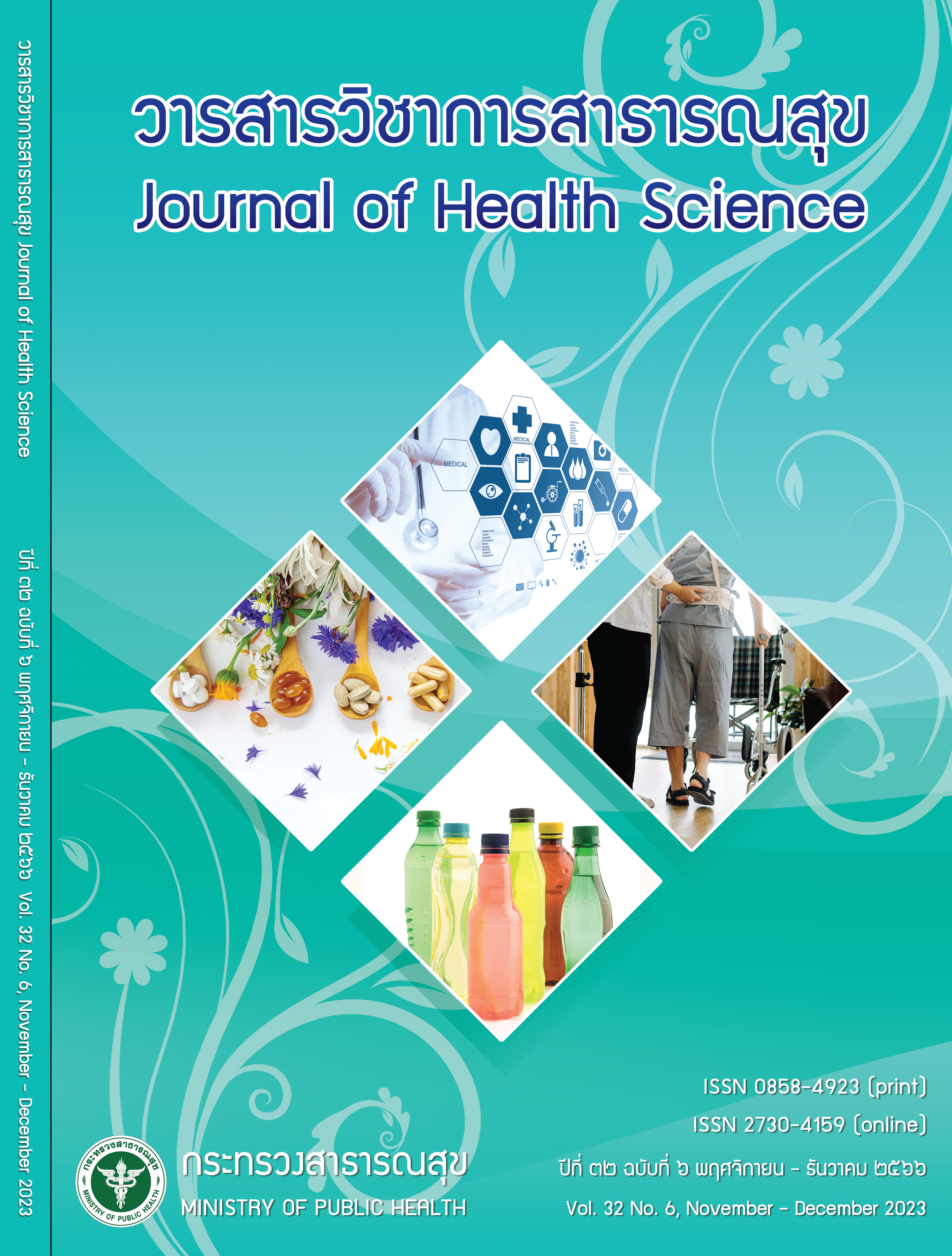A Study of Relationship between Health Belief Model, Social Support and Sweetened Beverages Consumption Behaviors among Secondary School Children Grade7 in Khok Pho District, Pattani Province, Southern Thailand
Keywords:
knowledge, behavior, sweetened beverage consumption behavior, school children grade 7Abstract
The positive change of sweetened beverage consumption behavior is expected to improve quality of life and gain better health among school children grade 7. This survey study purposed to examine the relationship between health belief patterns, social support and sweetened beverage consumption behavior among 76 school children grade 7 in Khokpho district, Pattani province. Data were collected using questionnaires; and were analyzed by using descriptive analysis. The relationship between health belief patterns, social support and sweetened beverage consumption behavior was analyzed using spearman Rho. The results found that participants were male (53.9%), aged 13-year-old (65.8%), BMI between 18.50 and 24.99 (55.26%). Most were Muslim (86.8%), with household income ranging from 5,001 to 10,000 baht (39.4%). All had no health check-up in one year (100.0%) while 60.5% of the students did not received information about diseases caused by the consumption of sweetened beverage. Perceived severity, perceived risk of disease, perceived benefits, perceived barrier, self-efficacy and social support showed significantly related to sweetened beverage consumption behavior (p<0.05).
Downloads
References
กรมอนามัยกระทรวงสาธารณสุข. เผยแนวโน้มเด็กไทยติดเครื่องดื่มชงรสหวาน แนะโรงเรียนจัดเครื่องดื่มหวานน้อย เป็นทางเลือกสุขภาพ [อินเทอร์เน็ต]. 2565 [สืบค้นเมื่อ 25 พ.ย. 2565]. แหล่งข้อมูล: https://multimedia.anamai. moph.go.th/news/news291065/
กรมอนามัยกระทรวงสาธารณสุข. รายงานการสำรวจของกรม อนามัยและสำนักงานกองทุนสนับสนุนการสร้างเสริมสุขภาพ [อินเทอร์เน็ต]. 2565 [สืบค้นเมื่อ 10 ธ.ค. 2565]. แหล่ง ข้อมูล: https://hp.anamai.moph.go.th/th/annualreport
สำนักสารนิเทศ สำนักงานปลัดกระทรวงสาธาณสุข. ผลสำรวจ ชี้’เด็กไทย’85% บริโภคน้ำอัดลมและเครื่องดื่มรสหวานเพิ่ม สูง [อินเทอร์เน็ต]. 2564 [สืบค้นเมื่อ 25 พ.ย. 2565]. แหล่ง ข้อมูล: https://pr.moph.go.th/?url=pr/detail/2/02/ 184520/
ณัฐพัชร์ แก้วพิทักษ์คุณ. ทัศนคติและปัจจัยส่วนประสมทางการตลาดที่มีผลต่อการตัดสินใจซื้อเครื่องดื่มประเภท น้ำหวานของผู้บริโภคในช่วงมัธยมศึกษา ในเขตกรุงเทพมหานคร [การค้นคว้าอิสระหลักสูตรบริหารธุรกิจมหาบัณฑิต]. กรุงเทพมหานคร: มหาวิทยาลัยธรรมศาสตร์; 2563.
Malik VS, Pan A, Willett WC, Hu FB. Sugar-sweetened beverages and weight gain in children and adults: a systematic review and meta-analysis. Am J Clin Nutr 2013; 98(4):1084-102.
กระทรวงสาธารณสุข. แนะนำปฏิบัติสุขบัญญัติ [อินเทอร์เน็ต]. 2565 [สืบค้นเมื่อ 25 พ.ย. 2565]. แหล่งข้อมูล: https:// prgroup.hss.moph.go.th/news?start=9
งานอนามัยโรงเรียน โรงเรียนนิคมสร้างตนเองมิตรภาพที่ 148 พฤติกรรมการบริโภคเครื่องดื่มหวาน [อินเทอร์เน็ต]. 2565 [สืบค้นเมื่อ 14 เม.ย. 2566]. แหล่งข้อมูล: http:// nikomkhokpho148school.com/
Cunha D, Souza B, Pereira R, Sichieri R. Preventing excessive weight gain by encouraging healthy eating habits among adolescents in Brazil: a randomised community trial. The FASEB Journal 2012;26(1):257-7.
James J, Thomas P, Cavan D, Kerr D. Preventing childhood obesity by reducing consumption of carbonated drinks: cluster randomised controlled trial. BMJ 2004;328(7450):1237.
Levy TS, del Carmen Morales-Ruan M, Castellanos CA, Coronel AS, Aguilar AJ, Humarán IMG. School environment and its relationship with obesity in the state of Mexico. The FASEB Journal 2012;26(S1):629-9.
Rosenstock IM. Historical origins of the health belief model. Health Educ Monogr 1974;2(4):328-35.
Israel BA. Social networks and social support implications for national helper and community level interventions. Health Educ Q 1985;12(1):65-80.
Rabiei L, Masoudi R, Lotfizadeh M. Evaluation of the effectiveness of nutritional education based on health belief model on self-esteem and BMI of overweight and at risk of overweight adolescent girls. Int J Pediatr 2017;5(8):5419-30.
Chiang WL, Azlan A, Mohd Yusof BN. Effectiveness of education intervention to reduce sugar-sweetened beverages and 100% fruit juice in children and adolescents: a scoping review. Expert Rev Endocrinol Metab 2022;17(2):179-200.
Mazarello Paes V, Hesketh K, O’Malley C, Moore H, Summerbell C, Griffin S, et al. Determinants of sugar-sweetened beverage consumption in young children: a systematic review. Obes Rev 2015;16(11):903-13.
สโรชา นันทพงศ์, นฤมล ศราธพันธุ์,อภิญญา หิรัญวงษ์. ความรู้เกี่ยวกับโภชนาการและพฤติกรรมการจัดอาหารสำหรับเด็กวัยก่อนเรียนของผู้ปกครองโรงเรียนรัฐบาล จังหวัดชุมพร. วารสารวิจัยเกษตรศาสตร์ (สังคม) 2557; 35:235-44 .
Calabro R, Kemps E, Prichard I. Socio-cognitive determinants of sugar-sweetened beverage consumption among young people: a systematic review and metaanalysis. Appetite 2023;180:106334.
นภาพร เหมาะเหม็ง, ประทุม ยนต์เจริญล้ำ, สุธีรา พินิจ. การศึกษาภาวะโภชนาการและพฤติกรรมการบริโภคอาหารของนักเรียนในโรงเรียนส่งเสริมสุขภาพระดับเพชร. วารสารการส่งเสริมสุขภาพและอนามัยสิ่งแวดล้อมล้านนา 2560; 7(1):67-74.
Downloads
Published
How to Cite
Issue
Section
License

This work is licensed under a Creative Commons Attribution-NonCommercial-NoDerivatives 4.0 International License.





